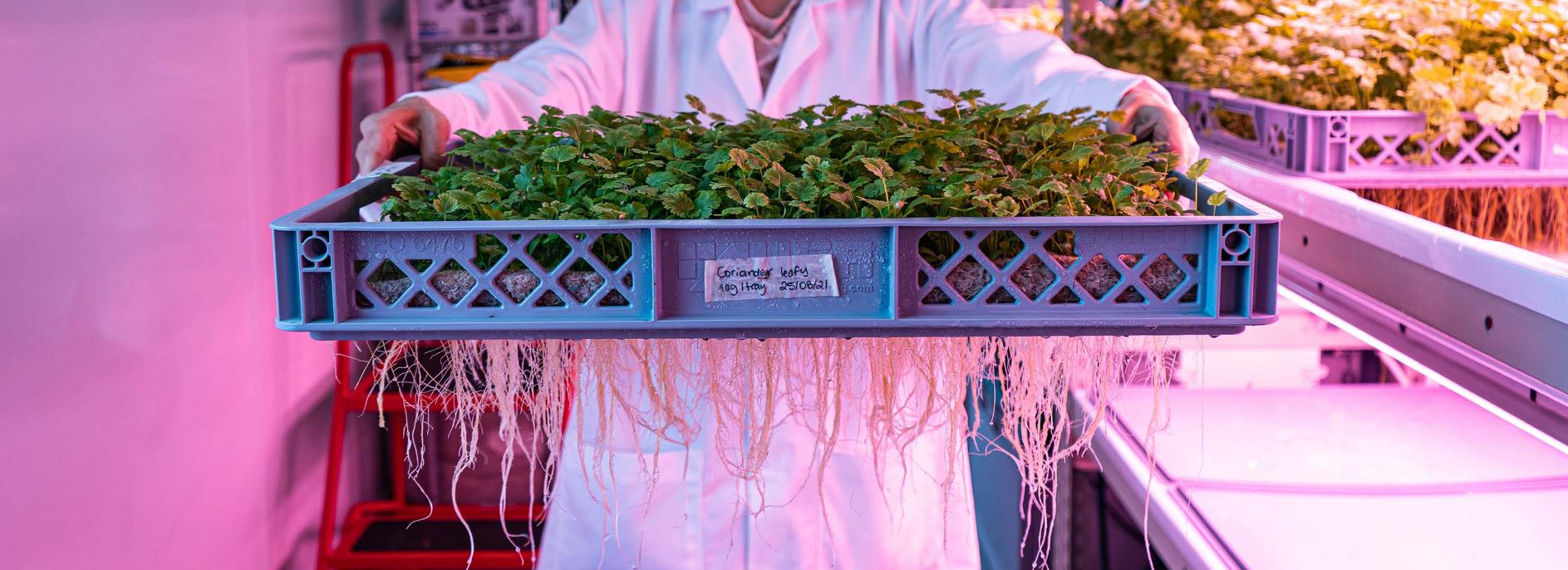
Grow It York
Grow It York is an urban indoor community farm in a shipping container, supplying hyper-local produce to the surrounding businesses and communities.
Context
There is an urgent need to transform the UK’s food system by placing healthy people and a healthy environment at its core (Bhunnoo & Poppy, 2020). By 2050 our food system must meet the demand for food from a human population projected to reach nearly 10 billion, while adapting to climate change and managing accelerating loss of biodiversity (Godfray et al. 2010; Banwart et al. 2015). Research shows transformation involves stimulating major synergistic pattern shifts in subsystems, working with social dynamics at different scales, developing new transformative innovations and niches, and stimulating change in political and socio-technical regimes (Fazey et al. 2017).
A number of concerns associated with our target food system has been identified, namely: poor diet particularly in deprived populations, unsustainable farming and a food economy failing to make the rapid shifts required. In the UK, poor diet results in 1 in 7 deaths every year (GBD, 2017), and many people consume above recommended free sugars and saturated fat and inadequate amounts of fibre, vitamin D, fruits and vegetables. At the same time, food production that supplies UK diets is unsustainable.
GHG emissions from UK agriculture are estimated to cost the UK £3.1 billion per year (Defra, 2018b). Agriculture is responsible for 10% of UK’s GHG emissions (judged by CO2e) as well as over half the UK’s methane emissions and 3⁄4 of its N2O, both much more potent GHG than CO2. Meeting the UK’s commitment to Net Zero by 2050 will require a rapid shift to low-carbon practices in farming (Lynch, Allen & Cain, 2020) and the wider FS.
In pursuit of a regenerative food system, Veldhuizen et al. (2020) introduced the ‘Missing Middle’ concept to signify the lack of coordinated action from food production to consumption (i.e. the actors, activities and outcomes involved in processing, procurement, manufacture, catering, retail and consumption). There are calls to develop new approaches and business models focused on environmental sustainability, equality and healthy nutrition. Doherty et al. (2014) define these new models as hybrids i.e., novel institutional forms (business models, alliances, networks) that challenge traditional conceptions of economic organising, and effectively balance pursuit of financial, social and environmental goals. However, there has been limited research to identify how they work and how they can be scaled-up and promoted. During the COVID-19 pandemic, these hybrid business models eg. Food Hubs have provided food system resilience at the local level by shortening supply chains (Grow Yorkshire, 2020).
Aims and Objectives
We are researching how hybrid businesses that prioritise social and environmental benefit (not just profit) can be encouraged in the food system. It will explore how these innovative businesses can help tackle the health, environment and economic challenges of how we produce, supply and eat food. This joint university-business community farm is the first of its kind, but there are plans to expand to other locations if the project is a success.
- Successful CIC Grow It York having significant local impact on GHG emissions, packaging, waste, and people’s health/consumption of leafy greens.
- Toolkit - knowledge of critical success factors - for setting up urban vertical farms.
- Changed policies to facilitate deployment of urban vertical farming in optimal way for environmental and people’s health and community building.
- Develop flagship school education and community programme of ‘Grow it York’ creating social and environmental impact.
News
The Grow it York community farm, estabilished by the University of York, has been awarded the Best Community Initiative Award at the World Vertical Farming awards 2022.
More details here: Vertical Farming World Award - Best Community Initiative
Related links
For more information please visit the Grow It York website.
Principal Investigators
Prof Katherine Denby, Department of Biology
Prof Bob Doherty, School for Business and Society
Co-Investigator
Prof Peter Ball, School for Business and Society
Related links
For more information please visit the Grow It York website.